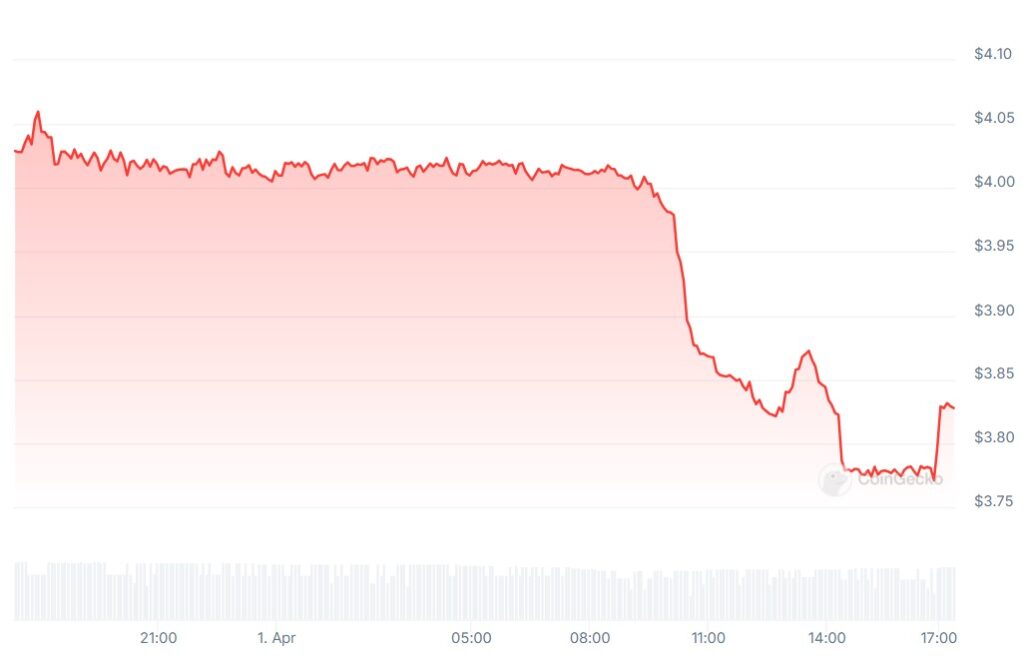An alarming security breach has rocked the open-source payment platform UPCX, leading to the theft of approximately million in digital assets. On April 1, 2024, blockchain security firm Cyvers alerted the crypto community to unauthorized access that allowed an unidentified party to withdraw a significant sum from UPCX’s management accounts. The incident involved the manipulation of administrative contracts that permitted fund transfers without proper oversight.
In response to the hacking event, UPCX has taken swift action by suspending all deposits and withdrawals. Although the team has reassured users that their assets remain secure, the price of UPC tokens took a hit, dropping 7% amid the scandal. CoinGecko reported a slide from a peak of .06 to a low of .77 as the news unfolded.
“This incident mirrors attack patterns we’ve documented in prior exploits, where access to critical administrative roles enabled malicious upgrades and fund drainage,” stated Meir Dolev, co-founder and chief technology officer of Cyvers.
As investigators delve deeper into the breach, the pattern of this attack raises serious concerns about vulnerabilities within Web3 platforms. Dolev indicated that a staggering 80% of crypto losses this year have been attributed to compromised credentials or inadequate access control mechanisms, highlighting an urgent need for enhanced security protocols throughout the industry. Notably, this incident marks a sharp increase in stolen crypto compared to the million lost in March, drawing attention to the ongoing security challenges in the cryptocurrency space.
UPCX Security Incident: Key Points to Note
The recent security breach involving UPCX has significant implications for users and the broader cryptocurrency ecosystem. Below are the key takeaways:
- Unauthorized Withdrawal of Funds
- Approximately million in digital assets were withdrawn without authorization.
- The breach involved 18.4 million UPC tokens, highlighting potential vulnerabilities in the system.
- Investigation and Response
- UPCX has suspended all deposits and withdrawals while investigating the incident.
- The team claims user assets are not affected by this breach.
- Market Impact
- Following the news of the breach, UPC token prices fell by 7%, indicating immediate market reactions to security issues.
- The price dropped from .06 to .77, prompting concerns among investors.
- Insights from Cybersecurity Expert
- Meir Dolev from Cyvers emphasized that the attack likely resulted from compromised credentials or flawed access controls.
- Such vulnerabilities have accounted for over 80% of losses in Web3 for 2024.
- Precedent of Similar Attacks
- The nature of the attack coincides with historical exploitation patterns, where hackers gained access to administrative roles.
- This incident underscores the immediate need for improved security measures in the crypto space.
- Increased Security Measures Required
- Calls for enhancements in wallet permissions and multisignature implementations have been emphasized.
- There is a growing urgency for businesses to invest in runtime transaction validation to prevent further incidents.
“The million stolen would more than double the amount lost in the previous month; old vulnerabilities continue to haunt crypto security.”
Unpacking the UPCX Security Breach: A Comparative Analysis
The recent incident involving UPCX is symptomatic of a larger issue gripping the cryptocurrency landscape. An unauthorized party managed to siphon approximately million from UPCX’s management accounts, highlighting vulnerabilities that continue to plague open-source payment platforms. This alarming breach not only led to a steep 7% drop in the UPC token price but also sheds light on ongoing trends in the sector, particularly with respect to security challenges faced by Web3 platforms.
Competitive Advantages: For cybersecurity firms like Cyvers, incidents such as the UPCX breach create an opportunity to underscore their expertise in identifying and mitigating risks. By providing insights into how such vulnerabilities occur, they position themselves as essential partners for platforms navigating this precarious landscape. Cyvers’ identification of compromised credentials and flawed access control as key issues provides a path for improvement and actionable advice for similar platforms. This is particularly beneficial to emerging startups in the decentralized finance (DeFi) sphere—where robust security needs to be prioritized from the outset to avoid costly hacks.
Furthermore, for regulatory bodies, such high-profile security failures may push for stricter regulations around crypto exchanges and payment platforms, potentially leading to enhanced consumer protections. Companies that prioritize security could stand to gain a competitive edge in this evolving regulatory environment.
Disadvantages and Challenges: On the flip side, the fallout from the UPCX breach could lead to increased skepticism among users hesitant to engage with newer digital asset platforms. The 7% dip in UPC’s token price serves as a stark reminder that users often flee at the first sign of trouble, impacting the overall market sentiment. This trend may create challenges for smaller players aiming to build trust in a sector already under scrutiny for its regulatory and security shortcomings.
The incident might also serve as a wake-up call to major platforms with histories of leniency regarding security practices. With data revealing that over 80% of stolen funds stemmed from compromised credentials, organizations may need to reevaluate their security measures more aggressively. Failing to do so could lead to catastrophic consequences not just for the platforms, but for users who place their trust in these systems.
Who Stands to Gain or Lose: Users who are currently invested in UPCX face an uncertain future; while the firm insists that user assets are unaffected, the overall reputation of the platform could take a hit. New traders might shy away from investing in UPCX until clearer security assurances are in place. Conversely, cybersecurity firms and experts may see a surge in demand for their services as platforms scramble to implement better security protocols against future breaches.
In conclusion, the UPCX incident serves as a critical case study for all stakeholders in the cryptocurrency ecosystem—from investors to developers—as they navigate the complex and often treacherous waters of digital finance.














